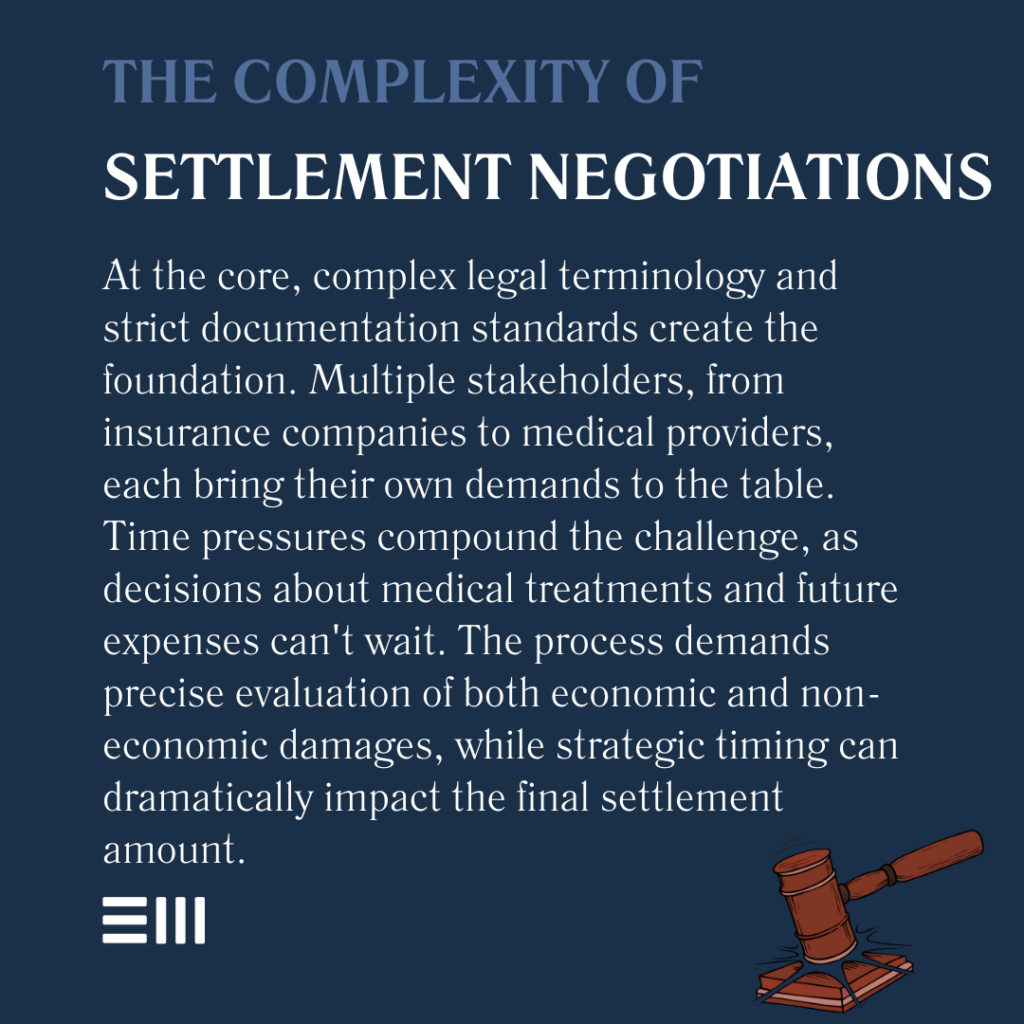
According to a recent study by the Insurance Research Council, accident victims who hired attorneys received settlements up to 3.5 times larger than those who negotiated on their own.
Behind every successful settlement lies a complex web of legal strategies, calculated moves, and expertise that can mean the difference between a life-changing outcome and years of financial struggle.
Understanding Settlement Negotiations
Settlement negotiations represent a pivotal moment in legal disputes where parties attempt to resolve their differences without proceeding to trial.
These discussions often involve multiple rounds of offers and counteroffers, requiring detailed knowledge of legal precedents and negotiation techniques.
What Makes Settlement Negotiations Complex
A successful negotiation process involves several intricate components that work together to achieve the desired outcome. Understanding these elements helps create a stronger foundation for your case.
- Complex legal terminology and documentation requirements can create obstacles for those unfamiliar with the process, requiring extensive knowledge of legal precedents and procedures;
- Multiple parties may be involved, including insurance companies, opposing counsel, medical providers, and various stakeholders, each with their own interests and demands;
- Time-sensitive decisions must be made while considering long-term implications, particularly regarding medical treatments and future expenses;
- Evaluation of both economic and non-economic damages requires extensive experience in similar cases and market values;
- Strategic timing of offers and responses can significantly impact the final settlement amount, especially when dealing with insurance company tactics;
- Documentation and evidence gathering must meet strict legal standards to support your position; and
- Understanding local laws and jurisdiction-specific requirements affects negotiation strategies.
These complexities underscore why professional guidance becomes essential in navigating settlement negotiations effectively.
Without proper legal representation, crucial details might be overlooked, potentially compromising your ability to secure fair compensation.

The Role of Legal Representation
Professional legal representation transforms the negotiation process through strategic advocacy and experienced guidance.
Your attorney serves as both advisor and protector of your interests.
- Attorneys provide objective evaluation of your case’s true worth based on similar precedents and current legal standards;
- Legal representatives handle all communication with opposing parties, preventing potentially costly mistakes and ensuring professional dialogue;
- Lawyers anticipate and counter common negotiation tactics used by insurance companies and opposing counsel;
- Professional representation ensures compliance with all legal requirements and deadlines throughout the process;
- Attorneys maintain detailed documentation of all negotiations and agreements for future reference;
- Expert witnesses and specialists can be brought in when needed to strengthen your position;
- Your lawyer can identify potential future complications and account for them in settlement terms; and
- Professional negotiators understand the psychology of settlement discussions and can leverage this knowledge.
Having skilled legal representation means you have an advocate who understands both the legal landscape and negotiation dynamics, working to protect your interests at every stage. This expertise often proves invaluable in securing more favorable settlement terms.
Key Benefits of Legal Representation
Having professional legal representation during settlement negotiations offers numerous advantages that can significantly impact your case’s outcome.
- Access to extensive legal resources and precedent cases that can support your position;
- Professional evaluation of settlement offers based on comprehensive case analysis and market trends;
- Protection from common negotiation pitfalls and pressure tactics used by opposing parties;
- Strategic timing of responses and counteroffers to maximize settlement potential;
- Expert handling of complex documentation and legal requirements throughout the process;
- Network of professional contacts, including medical experts and specialist consultants;
- Understanding of insurance company practices and common defense strategies;
- Ability to anticipate and prepare for potential complications before they arise;
- Experience in calculating and documenting both current and future damages; and
- Knowledge of tax implications and structured settlement options.
This professional guidance not only helps maximize your settlement potential but also provides peace of mind throughout the negotiation process. An experienced attorney’s involvement often leads to more comprehensive settlements that account for both immediate and long-term needs.
Common Settlement Negotiation Questions
Before diving into specific questions about settlement negotiations, it’s important to understand that each case presents unique challenges and opportunities.
Here are answers to frequently asked questions that can help you navigate the process more effectively.
What Factors Influence Settlement Amounts?
Understanding the elements that affect settlement values helps set realistic expectations and guides negotiation strategy:
- Severity and long-term impact of injuries or damages, including permanent disabilities;
- Available insurance coverage and policy limits across all potential sources;
- Strength of evidence supporting your claim, including expert testimonies;
- Comparative fault considerations and local liability laws;
- Economic damages including past and future medical expenses;
- Lost wages and diminished earning capacity;
- Pain and suffering calculations;
- Impact on quality of life and daily activities;
- Precedent cases in similar situations; and
- Local jury verdict trends and settlement patterns.
These factors work together to create a comprehensive picture of your case’s value. A thorough analysis of each element helps ensure that settlement negotiations account for all relevant aspects of your situation.

When Should You Accept a Settlement Offer?
Before making this crucial decision, carefully evaluate several key factors that impact the adequacy of a settlement offer:
- Current and future medical expenses, including potential complications;
- Lost wages and future earning capacity impact over your lifetime;
- Long-term implications of injuries, including needed accommodations;
- Strength of your legal position based on evidence and liability;
- Likelihood of success at trial versus settlement risks;
- Quality of life changes and ongoing limitations;
- Family impact and needed support services;
- Rehabilitation and therapy requirements;
- Insurance policy limits and available coverage; and
- Tax implications and structured settlement benefits.
Making an informed decision about accepting a settlement requires careful consideration of these factors.
Your attorney can help analyze whether an offer adequately compensates you for both current and future needs while explaining the pros and cons of accepting versus continuing negotiations.
How Long Do Settlement Negotiations Usually Take?
The timeline for settlement negotiations varies significantly based on several key factors:
- Complexity of the case and number of legal issues involved;
- Number of parties involved in the dispute;
- Severity of damages and ongoing medical treatment needs;
- Insurance company cooperation and response times;
- Available evidence and need for expert testimony;
- Court schedules and legal deadlines;
- Discovery process completion requirements;
- Medical treatment completion status;
- Multiple insurance policy involvement; and
- Opposing party’s willingness to negotiate.
Understanding these timeline factors helps set realistic expectations for the negotiation process. While some cases may settle within months, complex cases requiring extensive documentation and negotiation can take a year or longer to reach a satisfactory conclusion.
Steps to Successful Settlement Negotiations
A methodical approach to settlement negotiations increases your chances of achieving favorable results.
- Comprehensive case evaluation and documentation;
- Strategic development of negotiation strategy;
- Initial demand letter preparation;
- Response analysis and counter-offer formulation; and
- Final agreement review and execution.
Each step requires careful attention to detail and expert legal knowledge to ensure optimal outcomes.
Ready to Protect Your Interests?
Don’t navigate complex settlement negotiations alone. Our experienced legal team stands ready to advocate for your rights and maximize your settlement potential.
Contact us today for a confidential consultation and take the first step toward securing the compensation you deserve.
Can't find what you're looking for? Search our site below.










